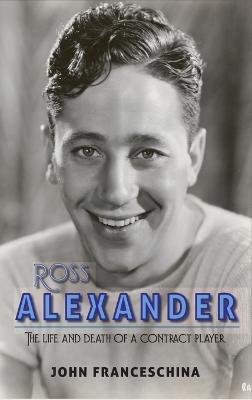Ross Alexander: The Life and Death of a Contract Player (hardback)

Ross Alexander: The Life and Death of a Contract Player (hardback)
Of all the screen juveniles groomed for stardom by Warner Brothers in the 1930s, few were touted as highly by Hal Wallis and Jack Warner as Ross Alexander. Strikingly handsome, with a sensuality that appealed to women (and men) of all ages, and possessed of a Puck-like good humor that endeared him to columnists, co-stars, and virtually everyone else in the Hollywood film community, Ross quickly became the golden boy of scene-stealers at Warners, after appearing in Flirtation Walk, with Dick Powell, Ruby Keeler, and Pat O'Brien, and Gentlemen Are Born, with Franchot Tone, Jean Muir, and Ann Dvorak. Like many of the actors in Hollywood at that time, Ross was recruited from Broadway where he played high-spirited juveniles in Let Us Be Gay, starring Charlotte Granville, Francine Larrimore and Warren William; That's Gratitude, with Frank Craven, Thelma Marsh, and George Barbier; and After Tomorrow, with Donald Meek and Barbara Robbins--all produced by song-writer, producer-director, John Golden, who "discovered" Ross performing with Antoinette Perry (the "Tony" of Broadway theatre awards), in the long-run flop, The Ladder. While Alexander's career at Warner's was in the ascendant in films like A Midsummer Night's Dream, Captain Blood, and Shipmates Forever, his marriage to actress (and New Jersey socialite) Aleta Freel had disintegrated, leading to Aleta's suicide in December 1935. Ross's best friend, Henry Fonda, believed that Alexander never recovered from his wife's death, even though he continued to appear onscreen in well-regarded roles until his own suicide in January 1937. According to contemporary reports, after Alexander's death, Warner Brothers purged his home of any and everything he might have written--poems, letters, script-notes, the works--in order to protect the studio from scandals related to Alexander's closeted homosexuality and other idiosyncrasies, including his alleged obsessive infatuation with Bette Davis. Surprisingly, in the 80 years that have passed since Alexander's death, no full-length study of the actor so beloved, but so quickly forgotten by Warner Brothers had existed until Ross Alexander: The life and death of a contract player, an investigation of Broadway and Hollywood during the 1920s and 1930s, from Prohibition through the Great Depression and the Production Code, with previously unpublished documents, and nearly 100 illustrations.
PRP: 330.67 Lei
Acesta este Pretul Recomandat de Producator. Pretul de vanzare al produsului este afisat mai jos.
297.60Lei
297.60Lei
330.67 LeiLivrare in 2-4 saptamani
Descrierea produsului
Of all the screen juveniles groomed for stardom by Warner Brothers in the 1930s, few were touted as highly by Hal Wallis and Jack Warner as Ross Alexander. Strikingly handsome, with a sensuality that appealed to women (and men) of all ages, and possessed of a Puck-like good humor that endeared him to columnists, co-stars, and virtually everyone else in the Hollywood film community, Ross quickly became the golden boy of scene-stealers at Warners, after appearing in Flirtation Walk, with Dick Powell, Ruby Keeler, and Pat O'Brien, and Gentlemen Are Born, with Franchot Tone, Jean Muir, and Ann Dvorak. Like many of the actors in Hollywood at that time, Ross was recruited from Broadway where he played high-spirited juveniles in Let Us Be Gay, starring Charlotte Granville, Francine Larrimore and Warren William; That's Gratitude, with Frank Craven, Thelma Marsh, and George Barbier; and After Tomorrow, with Donald Meek and Barbara Robbins--all produced by song-writer, producer-director, John Golden, who "discovered" Ross performing with Antoinette Perry (the "Tony" of Broadway theatre awards), in the long-run flop, The Ladder. While Alexander's career at Warner's was in the ascendant in films like A Midsummer Night's Dream, Captain Blood, and Shipmates Forever, his marriage to actress (and New Jersey socialite) Aleta Freel had disintegrated, leading to Aleta's suicide in December 1935. Ross's best friend, Henry Fonda, believed that Alexander never recovered from his wife's death, even though he continued to appear onscreen in well-regarded roles until his own suicide in January 1937. According to contemporary reports, after Alexander's death, Warner Brothers purged his home of any and everything he might have written--poems, letters, script-notes, the works--in order to protect the studio from scandals related to Alexander's closeted homosexuality and other idiosyncrasies, including his alleged obsessive infatuation with Bette Davis. Surprisingly, in the 80 years that have passed since Alexander's death, no full-length study of the actor so beloved, but so quickly forgotten by Warner Brothers had existed until Ross Alexander: The life and death of a contract player, an investigation of Broadway and Hollywood during the 1920s and 1930s, from Prohibition through the Great Depression and the Production Code, with previously unpublished documents, and nearly 100 illustrations.
Detaliile produsului









